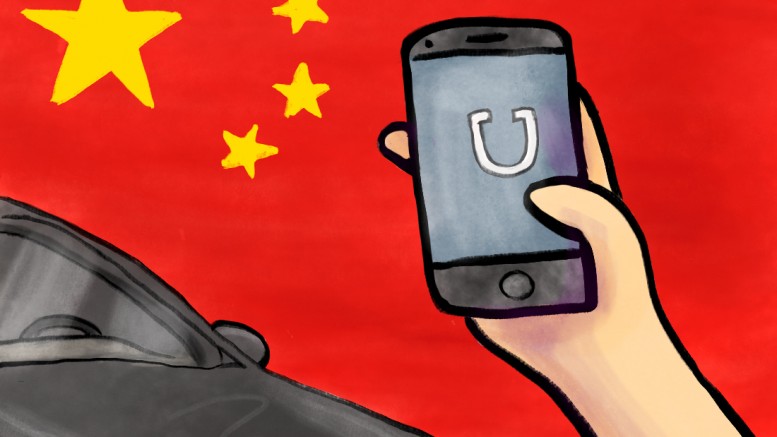Yesterday, the coalition of billionaires and entrepreneurs wanting to destroy Uber launched an already promised service: The ability for Lyft to fulfill rides booked via Didi Kuaidi’s app in the United States.
It’s the first step in an ambitious plan where Grab, Ola, Didi, and Lyft– the four major Uber spoilers in the world– will work together to provide a global ride sharing solution.
It’s anyone’s guess how well this will all work in practice. Let’s not pretend four distinct companies with different user interfaces, languages, and back ends will somehow just seamlessly work together.
It’s hard enough for Uber to operate the same in the United States, as it does in China where driver fraud is rampant. And that was before Uber announced plans to expand to motor-bikes, a specialty of Grab in Southeast Asian countries where traditional ridesharing only means you are stuck in endless traffic in someone else’s car. As usual, Uber’s ambition and the press release belies the complexity it’ll face actually pulling this off. Anyone who has spent time in these markets knows, most motorbike drivers in cities like Jakarta speak no English, deal only in cash, and can’t be recruited via online apps. Grab has substantial local on the ground operations to make this work– and their teams are from these markets. That’s the kind of investment that Uber usually eschews, preferring instead to spend billions per year on subsidies.
For those who have spent decades watching Valley companies trying– and largely failing– to compete in China, Lyft’s approach of ceding the market to the undisputed giant in exchange for some additional investment dollars and revenue share dollars may wind up being the smarter option– the same way Yahoo’s Jerry Yang “won” in China by investing in a fledgling Alibaba. It will certainly be the more cost effective strategy. Without an IPO, China may well bleed Uber dry, and Uber has raised several times the capital of Lyft.
But it struck me yesterday reading the “news” about a thing that had already been announced in a splashy press conference last September, how much the narrative around Didi and Uber has changed since then. There have been three major shifts in the market view.
The first is that the press and the world has dropped the facade that Uber is “killing it” in China in the face of all evidence, acknowledging that Uber simply hasn’t been able to gain a meaningful foothold. Imagine what would happen to Uber’s market share if it wasn’t spending $1 billion in subsidies a year.
Secondly, Didi’s numbers show that it’s long-since passed Uber as the world’s largest ridesharing company in terms of rides. Just in 2015 it did 40% more rides than Uber has done it its entire life. As of a month ago, Didi is doing 10 million rides per day, eight times the entire ridesharing market in all of North America. And it’s still growing at a fast clip.
Not only that, but sources tell me that Didi has pulled back on discounting, finding that it’s dominant enough in China, it doesn’t have to match Uber quite as aggressively on price as it had last summer. Didi has also said it is profitable in many of its largest cities. And it’s raising another $1 billion in capital, despite saying it hasn’t yet spent the $3 billion it raised last year. If true, that means Didi isn’t just substantially bigger than Uber in terms of rides, it’s also better capitalized– two things that the world assumed a year ago were Uber’s absolute birth rights when it came to ridesharing.
The third is that Didi isn’t just big because of China, it is big for China. Last month, it announced that Didi is the second largest online transaction platform in all of China, behind just Taobao.
Back in September, the announcement that Didi, Ola, Grab, and Lyft were partnering up was seen as some reaction to Uber’s pugnacious dominance. Now just seven months later, it looks like something else: Grab, Ola, and Lyft partnering up with the world’s largest and best capitalized ridesharing company because, well, they aren’t dumb enough to enter China themselves, so why wouldn’t they? Suddenly, the Didi coalition looks to be the one operating from a position of strength if you live anywhere in the world that isn’t the United States.
Uber CEO Travis Kalanick has said he wants to put off an Uber IPO as long as possible. The reasons why are obvious. Uber is skyrocketing in growth and valuation right now, but at the same time the company is a mess of billions of dollars in subsidies to prop up that growth, bruising international battles in pretty much every major market except the UK, a potential class action driver lawsuit and union battle that could destroy its current economics. Right now, Uber’s founders control the board and don’t have to listen to anyone, no matter how bad the press gets. If they go public that changes dramatically.
Uber’s plan instead was to take Uber China public on the Hong Kong stock exchange to continue to subsidize its money losing, futile battle. But the more ascendant Didi gets, the harder that sale is going to be to Asian investors. Already a year ago when Uber looked far stronger, Uber Global had to put in one third of Uber China’s private equity round because no institutions other than Baidu would participate. Even those that had already funded Uber Global, like Hillhouse Capital. They were happy to back Uber in the US, but they backed Didi when it came to the Chinese market. Why wouldn’t they?
I wouldn’t be surprised if Didi’s playbook with this new $1 billion round is like the one Uber ran against Lyft in the US: We are raising a new round, if you don’t invest in Lyft, you can invest in us. If so, expect Uber to cry foul, with it’s typical lack of self-awareness. Afterall, it recently cried foul that Ola was booking fake rides to sabotage its business in India. You know, pretty much what it also tried to do to Lyft here. If Uber investors didn’t believe in karma before this journey, they will by the end.
To be generous to Uber, you could look at it this way: Didi is merely as strong in China as Uber is in America. Local companies typically win large local markets. But if you are an Uber investor there are three big problems with that: Didi isn’t trying to win other markets, it’s partnering instead; the Chinese market is many times larger than the US; and Uber’s valuation is several times the size of Didi’s.
I’ve said it before: The best thing that could happen to Uber at this point is getting banned in China. It would allow the company to save face, and play the wounded free market American company that just wasn’t allowed to compete, rather than the company failing at a rate of $1 billion per year. It would give them an excuse for not executing on the promise of growing into its $60 billion valuation via International growth.
And there’s a reason it hasn’t happened yet: Uber has no meaningful market share in China and the longer it wastes time and money there, the more it helps Didi, Lyft, Ola, and Grab.
Source: pando.com




